Nursing Assignment: Therapeutic Relationships and Professionalism
VerifiedAdded on 2022/10/10
|5
|1039
|310
Essay
AI Summary
This nursing assignment delves into the critical attributes of a nursing professional, emphasizing the importance of communication skills, empathy, emotional stability, and interpersonal abilities in delivering quality patient care. The paper explores the significance of therapeutic relationships and how these attributes contribute to a positive healthcare environment, fostering trust and respect between nurses and patients. It also highlights the role of nursing standards, as defined by the Australian Nursing and Midwifery Board (NMBA), in guiding professional behavior and developing effective therapeutic approaches. The assignment uses literature to support the importance of these attributes and their impact on the patient's physical, emotional, and spiritual wellbeing, and the student's ability to develop a professional and collaborative approach in the clinical setting. The assignment underscores the need for nurses to be compassionate, understanding, and able to make informed decisions to enhance the overall quality of patient care.
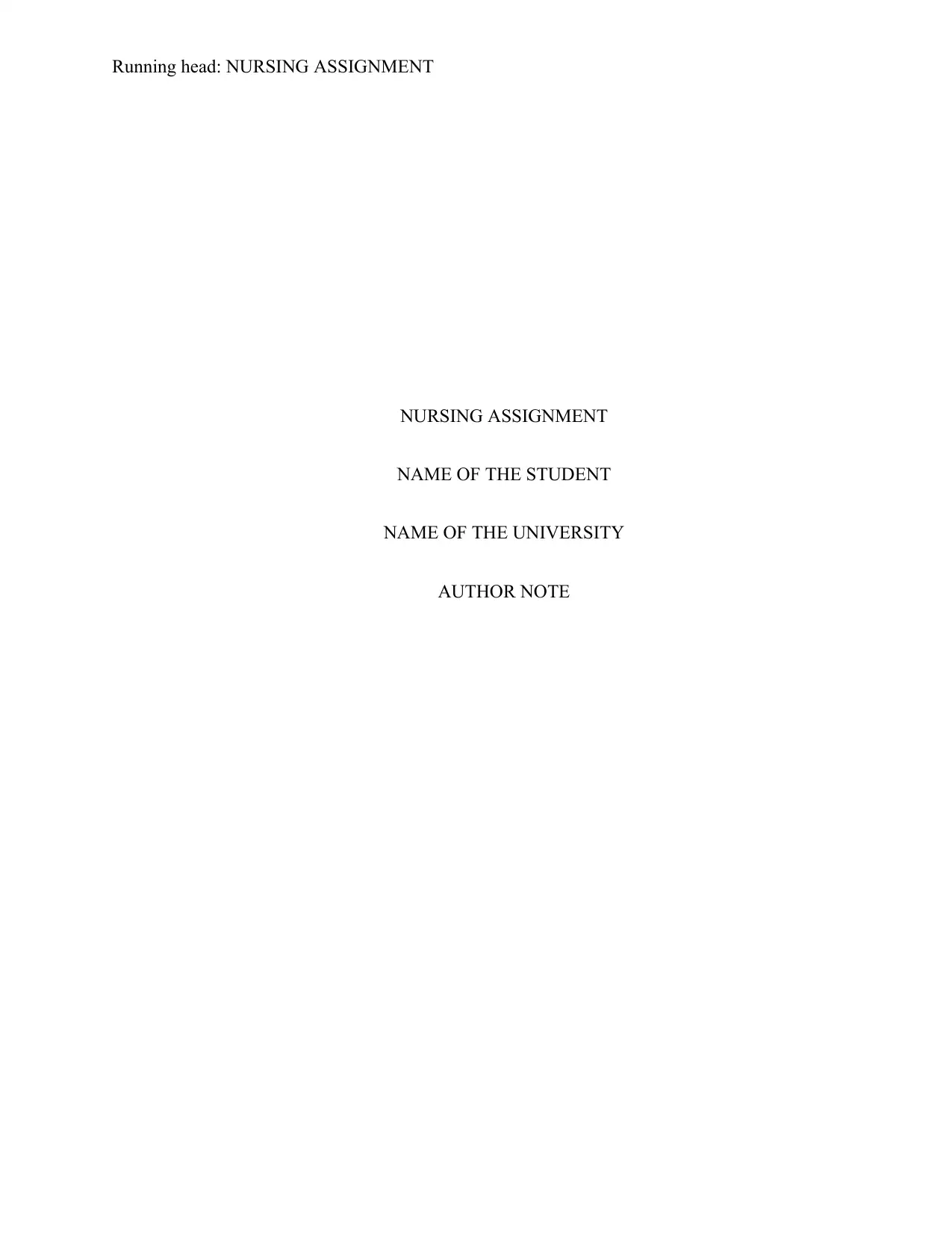
Running head: NURSING ASSIGNMENT
NURSING ASSIGNMENT
NAME OF THE STUDENT
NAME OF THE UNIVERSITY
AUTHOR NOTE
NURSING ASSIGNMENT
NAME OF THE STUDENT
NAME OF THE UNIVERSITY
AUTHOR NOTE
Paraphrase This Document
Need a fresh take? Get an instant paraphrase of this document with our AI Paraphraser
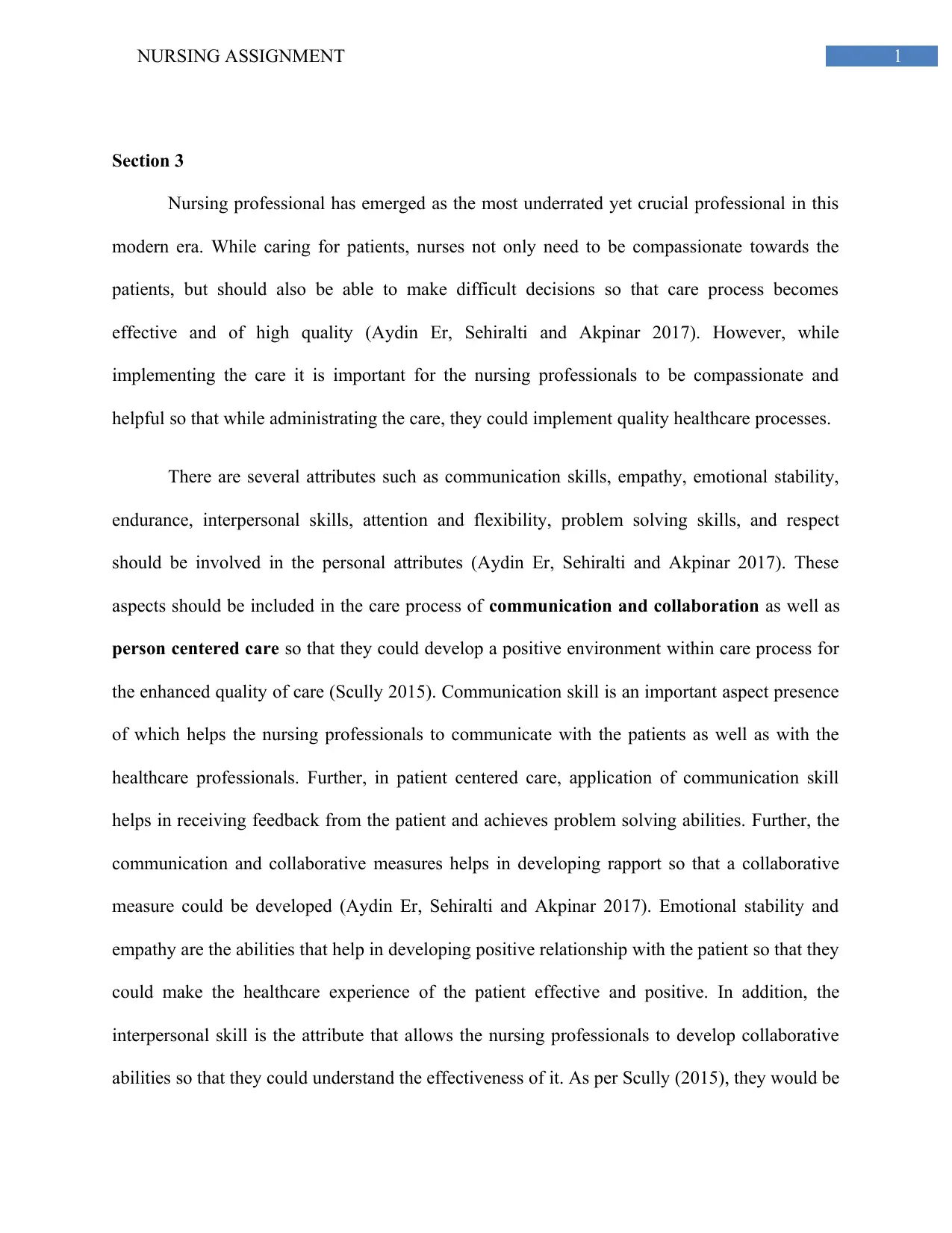
1NURSING ASSIGNMENT
Section 3
Nursing professional has emerged as the most underrated yet crucial professional in this
modern era. While caring for patients, nurses not only need to be compassionate towards the
patients, but should also be able to make difficult decisions so that care process becomes
effective and of high quality (Aydin Er, Sehiralti and Akpinar 2017). However, while
implementing the care it is important for the nursing professionals to be compassionate and
helpful so that while administrating the care, they could implement quality healthcare processes.
There are several attributes such as communication skills, empathy, emotional stability,
endurance, interpersonal skills, attention and flexibility, problem solving skills, and respect
should be involved in the personal attributes (Aydin Er, Sehiralti and Akpinar 2017). These
aspects should be included in the care process of communication and collaboration as well as
person centered care so that they could develop a positive environment within care process for
the enhanced quality of care (Scully 2015). Communication skill is an important aspect presence
of which helps the nursing professionals to communicate with the patients as well as with the
healthcare professionals. Further, in patient centered care, application of communication skill
helps in receiving feedback from the patient and achieves problem solving abilities. Further, the
communication and collaborative measures helps in developing rapport so that a collaborative
measure could be developed (Aydin Er, Sehiralti and Akpinar 2017). Emotional stability and
empathy are the abilities that help in developing positive relationship with the patient so that they
could make the healthcare experience of the patient effective and positive. In addition, the
interpersonal skill is the attribute that allows the nursing professionals to develop collaborative
abilities so that they could understand the effectiveness of it. As per Scully (2015), they would be
Section 3
Nursing professional has emerged as the most underrated yet crucial professional in this
modern era. While caring for patients, nurses not only need to be compassionate towards the
patients, but should also be able to make difficult decisions so that care process becomes
effective and of high quality (Aydin Er, Sehiralti and Akpinar 2017). However, while
implementing the care it is important for the nursing professionals to be compassionate and
helpful so that while administrating the care, they could implement quality healthcare processes.
There are several attributes such as communication skills, empathy, emotional stability,
endurance, interpersonal skills, attention and flexibility, problem solving skills, and respect
should be involved in the personal attributes (Aydin Er, Sehiralti and Akpinar 2017). These
aspects should be included in the care process of communication and collaboration as well as
person centered care so that they could develop a positive environment within care process for
the enhanced quality of care (Scully 2015). Communication skill is an important aspect presence
of which helps the nursing professionals to communicate with the patients as well as with the
healthcare professionals. Further, in patient centered care, application of communication skill
helps in receiving feedback from the patient and achieves problem solving abilities. Further, the
communication and collaborative measures helps in developing rapport so that a collaborative
measure could be developed (Aydin Er, Sehiralti and Akpinar 2017). Emotional stability and
empathy are the abilities that help in developing positive relationship with the patient so that they
could make the healthcare experience of the patient effective and positive. In addition, the
interpersonal skill is the attribute that allows the nursing professionals to develop collaborative
abilities so that they could understand the effectiveness of it. As per Scully (2015), they would be
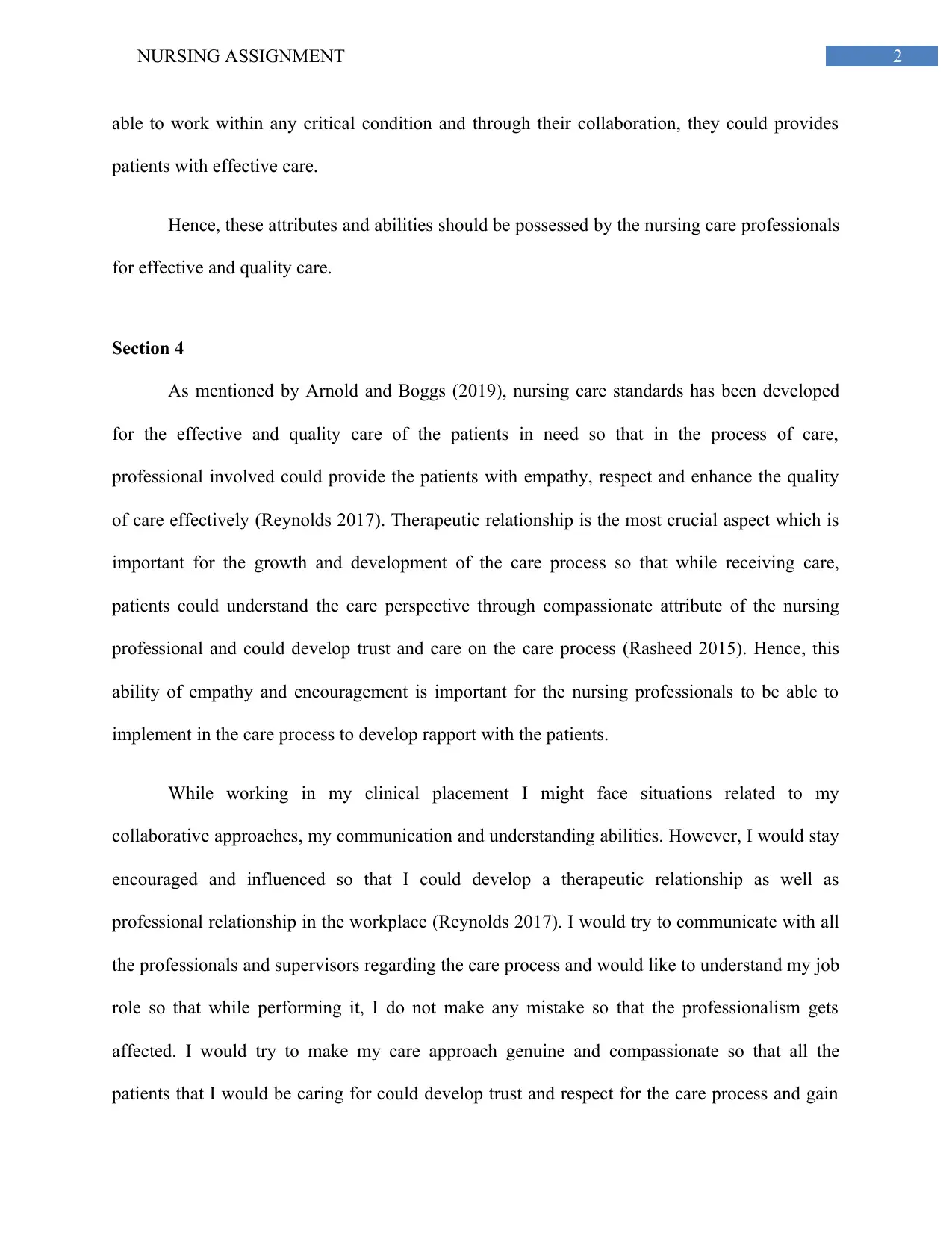
2NURSING ASSIGNMENT
able to work within any critical condition and through their collaboration, they could provides
patients with effective care.
Hence, these attributes and abilities should be possessed by the nursing care professionals
for effective and quality care.
Section 4
As mentioned by Arnold and Boggs (2019), nursing care standards has been developed
for the effective and quality care of the patients in need so that in the process of care,
professional involved could provide the patients with empathy, respect and enhance the quality
of care effectively (Reynolds 2017). Therapeutic relationship is the most crucial aspect which is
important for the growth and development of the care process so that while receiving care,
patients could understand the care perspective through compassionate attribute of the nursing
professional and could develop trust and care on the care process (Rasheed 2015). Hence, this
ability of empathy and encouragement is important for the nursing professionals to be able to
implement in the care process to develop rapport with the patients.
While working in my clinical placement I might face situations related to my
collaborative approaches, my communication and understanding abilities. However, I would stay
encouraged and influenced so that I could develop a therapeutic relationship as well as
professional relationship in the workplace (Reynolds 2017). I would try to communicate with all
the professionals and supervisors regarding the care process and would like to understand my job
role so that while performing it, I do not make any mistake so that the professionalism gets
affected. I would try to make my care approach genuine and compassionate so that all the
patients that I would be caring for could develop trust and respect for the care process and gain
able to work within any critical condition and through their collaboration, they could provides
patients with effective care.
Hence, these attributes and abilities should be possessed by the nursing care professionals
for effective and quality care.
Section 4
As mentioned by Arnold and Boggs (2019), nursing care standards has been developed
for the effective and quality care of the patients in need so that in the process of care,
professional involved could provide the patients with empathy, respect and enhance the quality
of care effectively (Reynolds 2017). Therapeutic relationship is the most crucial aspect which is
important for the growth and development of the care process so that while receiving care,
patients could understand the care perspective through compassionate attribute of the nursing
professional and could develop trust and care on the care process (Rasheed 2015). Hence, this
ability of empathy and encouragement is important for the nursing professionals to be able to
implement in the care process to develop rapport with the patients.
While working in my clinical placement I might face situations related to my
collaborative approaches, my communication and understanding abilities. However, I would stay
encouraged and influenced so that I could develop a therapeutic relationship as well as
professional relationship in the workplace (Reynolds 2017). I would try to communicate with all
the professionals and supervisors regarding the care process and would like to understand my job
role so that while performing it, I do not make any mistake so that the professionalism gets
affected. I would try to make my care approach genuine and compassionate so that all the
patients that I would be caring for could develop trust and respect for the care process and gain
⊘ This is a preview!⊘
Do you want full access?
Subscribe today to unlock all pages.

Trusted by 1+ million students worldwide
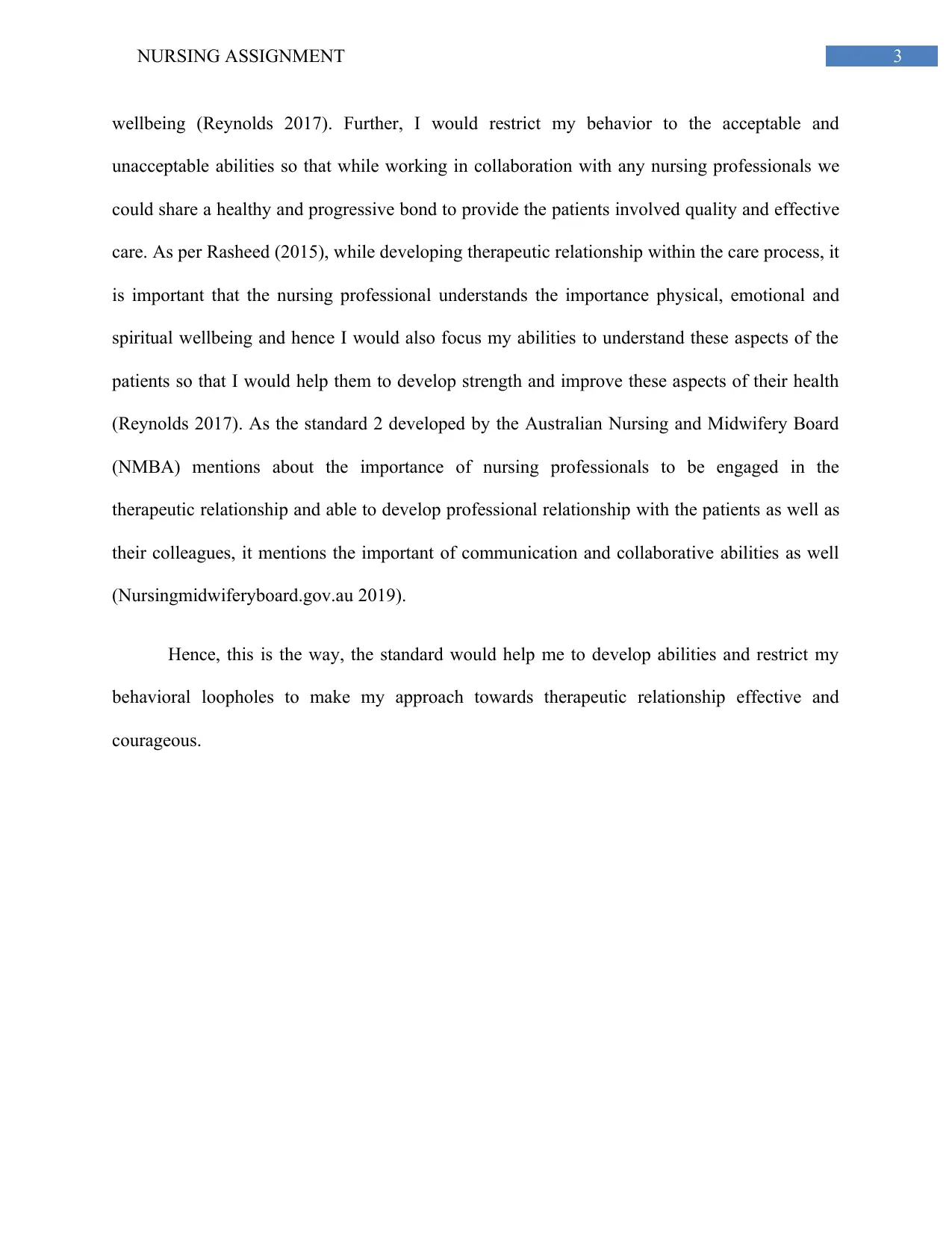
3NURSING ASSIGNMENT
wellbeing (Reynolds 2017). Further, I would restrict my behavior to the acceptable and
unacceptable abilities so that while working in collaboration with any nursing professionals we
could share a healthy and progressive bond to provide the patients involved quality and effective
care. As per Rasheed (2015), while developing therapeutic relationship within the care process, it
is important that the nursing professional understands the importance physical, emotional and
spiritual wellbeing and hence I would also focus my abilities to understand these aspects of the
patients so that I would help them to develop strength and improve these aspects of their health
(Reynolds 2017). As the standard 2 developed by the Australian Nursing and Midwifery Board
(NMBA) mentions about the importance of nursing professionals to be engaged in the
therapeutic relationship and able to develop professional relationship with the patients as well as
their colleagues, it mentions the important of communication and collaborative abilities as well
(Nursingmidwiferyboard.gov.au 2019).
Hence, this is the way, the standard would help me to develop abilities and restrict my
behavioral loopholes to make my approach towards therapeutic relationship effective and
courageous.
wellbeing (Reynolds 2017). Further, I would restrict my behavior to the acceptable and
unacceptable abilities so that while working in collaboration with any nursing professionals we
could share a healthy and progressive bond to provide the patients involved quality and effective
care. As per Rasheed (2015), while developing therapeutic relationship within the care process, it
is important that the nursing professional understands the importance physical, emotional and
spiritual wellbeing and hence I would also focus my abilities to understand these aspects of the
patients so that I would help them to develop strength and improve these aspects of their health
(Reynolds 2017). As the standard 2 developed by the Australian Nursing and Midwifery Board
(NMBA) mentions about the importance of nursing professionals to be engaged in the
therapeutic relationship and able to develop professional relationship with the patients as well as
their colleagues, it mentions the important of communication and collaborative abilities as well
(Nursingmidwiferyboard.gov.au 2019).
Hence, this is the way, the standard would help me to develop abilities and restrict my
behavioral loopholes to make my approach towards therapeutic relationship effective and
courageous.
Paraphrase This Document
Need a fresh take? Get an instant paraphrase of this document with our AI Paraphraser
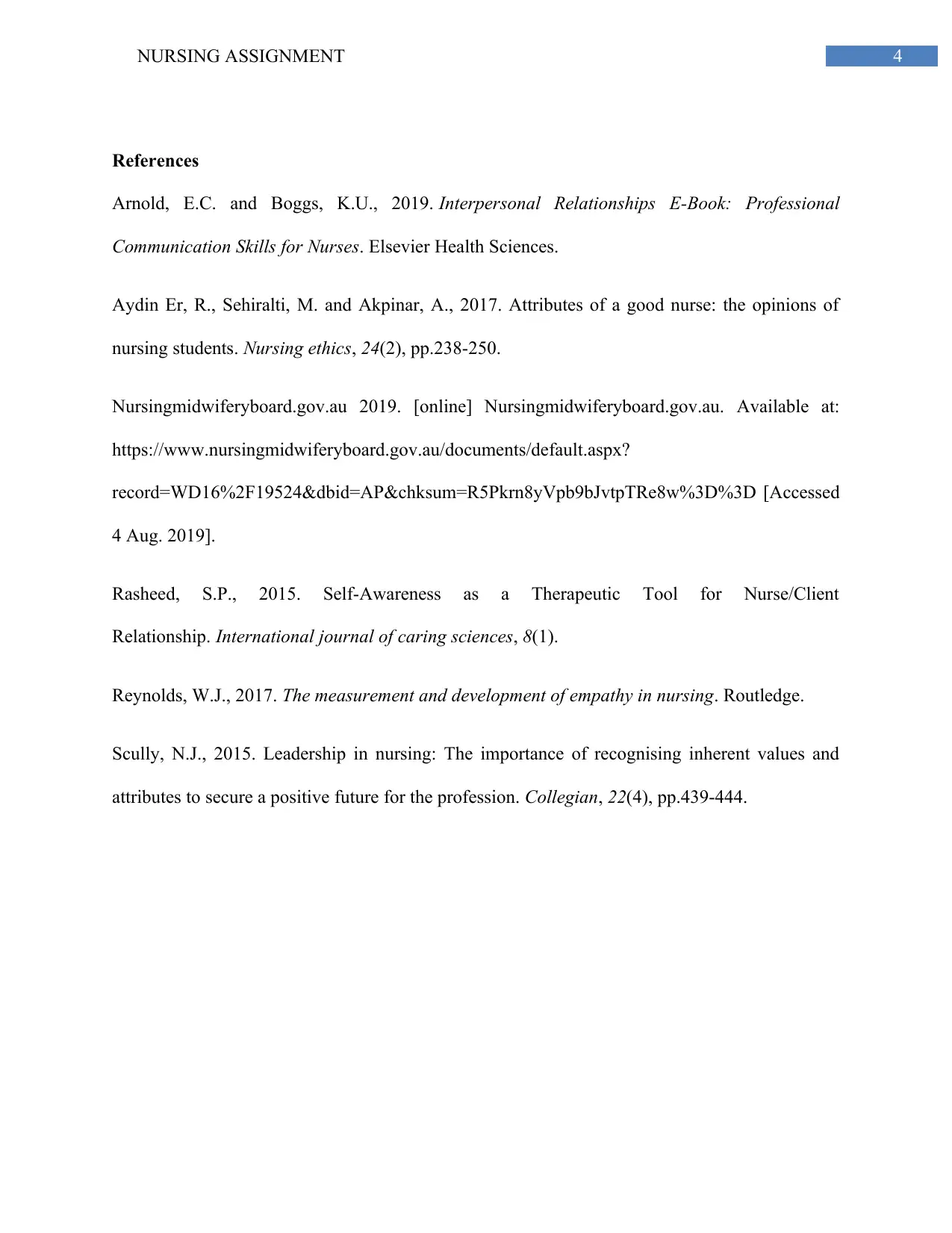
4NURSING ASSIGNMENT
References
Arnold, E.C. and Boggs, K.U., 2019. Interpersonal Relationships E-Book: Professional
Communication Skills for Nurses. Elsevier Health Sciences.
Aydin Er, R., Sehiralti, M. and Akpinar, A., 2017. Attributes of a good nurse: the opinions of
nursing students. Nursing ethics, 24(2), pp.238-250.
Nursingmidwiferyboard.gov.au 2019. [online] Nursingmidwiferyboard.gov.au. Available at:
https://www.nursingmidwiferyboard.gov.au/documents/default.aspx?
record=WD16%2F19524&dbid=AP&chksum=R5Pkrn8yVpb9bJvtpTRe8w%3D%3D [Accessed
4 Aug. 2019].
Rasheed, S.P., 2015. Self-Awareness as a Therapeutic Tool for Nurse/Client
Relationship. International journal of caring sciences, 8(1).
Reynolds, W.J., 2017. The measurement and development of empathy in nursing. Routledge.
Scully, N.J., 2015. Leadership in nursing: The importance of recognising inherent values and
attributes to secure a positive future for the profession. Collegian, 22(4), pp.439-444.
References
Arnold, E.C. and Boggs, K.U., 2019. Interpersonal Relationships E-Book: Professional
Communication Skills for Nurses. Elsevier Health Sciences.
Aydin Er, R., Sehiralti, M. and Akpinar, A., 2017. Attributes of a good nurse: the opinions of
nursing students. Nursing ethics, 24(2), pp.238-250.
Nursingmidwiferyboard.gov.au 2019. [online] Nursingmidwiferyboard.gov.au. Available at:
https://www.nursingmidwiferyboard.gov.au/documents/default.aspx?
record=WD16%2F19524&dbid=AP&chksum=R5Pkrn8yVpb9bJvtpTRe8w%3D%3D [Accessed
4 Aug. 2019].
Rasheed, S.P., 2015. Self-Awareness as a Therapeutic Tool for Nurse/Client
Relationship. International journal of caring sciences, 8(1).
Reynolds, W.J., 2017. The measurement and development of empathy in nursing. Routledge.
Scully, N.J., 2015. Leadership in nursing: The importance of recognising inherent values and
attributes to secure a positive future for the profession. Collegian, 22(4), pp.439-444.
1 out of 5
Related Documents
Your All-in-One AI-Powered Toolkit for Academic Success.
+13062052269
info@desklib.com
Available 24*7 on WhatsApp / Email
![[object Object]](/_next/static/media/star-bottom.7253800d.svg)
Unlock your academic potential
Copyright © 2020–2026 A2Z Services. All Rights Reserved. Developed and managed by ZUCOL.





